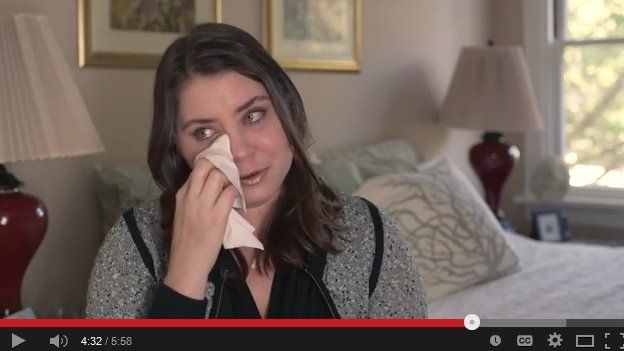Terminally ill woman Brittany Maynard delays suicide
- Published

Several weeks ago, we wrote about the controversy surrounding Brittany Maynard's plan to take her own life on 1 November.
She has a highly aggressive form of brain cancer, and she had announced that she wanted to end her life on "her own terms".
In a video posted to her website on Wednesday evening, she said those terms had changed.
"I still feel good enough and I still have enough joy and I still laugh and smile with my family and friends enough that it doesn't seem like the right time right now," she says. "But it will come, because I feel myself getting sicker."
She says that her growing brain tumour has caused her to have seizures that have at times limited her ability to speak.
Ms Maynard had moved with her family from California to Oregon, which allows physician-assisted suicide, and has become an outspoken advocate of allowing terminal patients to end their lives.
"The worst thing that can happen to me is I wait too long because I'm trying to seize each day but that I somehow have my autonomy taken away from me by my disease because of the nature of my cancer."
Ms Maynard's announcement was greeted warmly by some of the groups that had expressed concern over her previous timetable.
"Today, Brittany Maynard wants to live," writes Kathy Schiffer on the religious website Patheos.com. "Somehow - perhaps as a result of the prayers of thousands of people around the world - she has found the strength and determination to push forward."
"Now and on 1 November, All Saints Day, let us storm heaven for this lovely young woman," she continues. "Let us pray that God will grant her the grace to live well and love much, and to put her life in His hands."
Syndicated columnist Connie Schultz says that critics shouldn't judge Ms Maynard as she grapples with her condition.
"I am grateful for her willingness to share an internal evolution that illustrates what hospice workers emphasize in their quiet, mostly anonymous work: When we feel in control of our lives, and can turn to professionals for help with symptom management, our expectations can change," she writes on Facebook. "I hope Brittany Maynard's story coaxes us to contemplate what our own lives mean to us, rather than to cast judgment on how she has decided to make sense of hers."
Physician Peter Rogatz, who co-founded an end-of-life care advocacy organisation in New York, writes in Newsday that Ms Maynard's situation is forcing the US public to come to grips with challenges presented by modern medicine.
"Whatever we may think of Maynard, her story has brought attention to an issue that grows in importance as modern technology has increasingly given us godlike ability to extend life - or at least to defer death," he says. "Different people will approach this issue differently, but society should respect each person's right to make this fundamental decision for herself or himself."